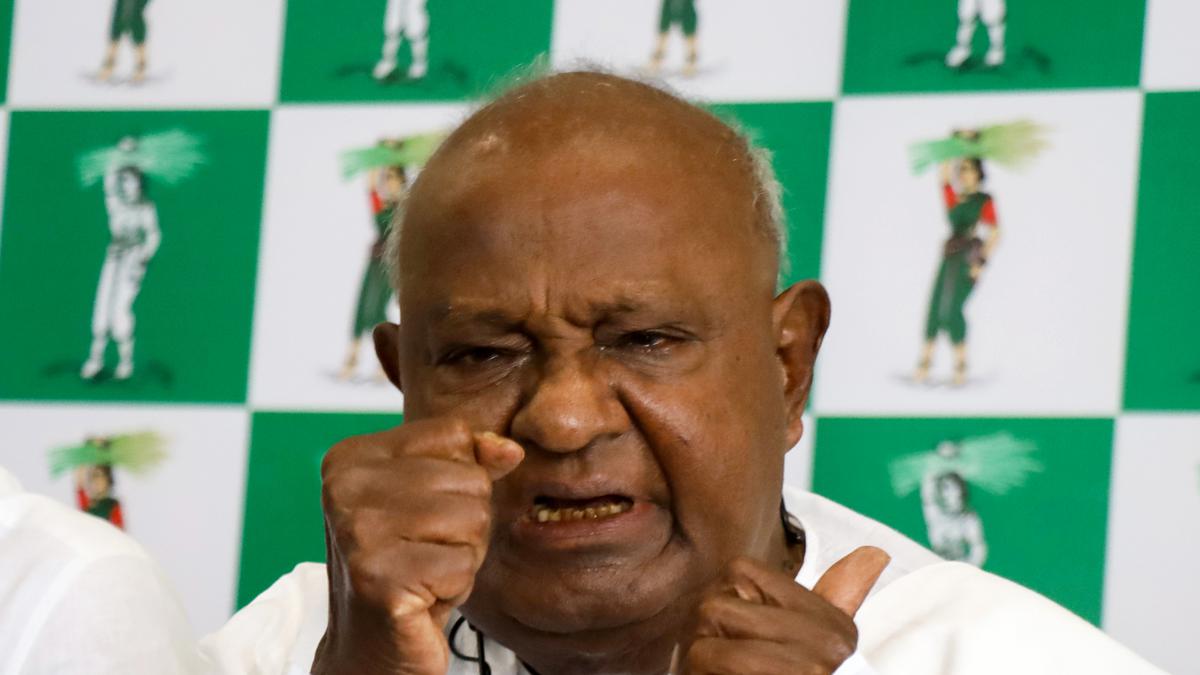
H.D. Deve Gowda writes to PM Narendra Modi urging the Centre to file a review petition in Supreme Court on Cauvery water sharing
The Hindu
Former Prime Minister and Janata Dal (Secular) supremo H.D. Deve Gowda on September 25, 2023 urged Prime Minister Narendra Modi to immediately intervene in the Cauvery river water sharing dispute between Karnataka and Tamil Nadu, and urged the Centre to file a review petition in the Supreme Court.
Former Prime Minister and Janata Dal (Secular) supremo H.D. Deve Gowda on September 25, 2023 urged Prime Minister Narendra Modi to immediately intervene in the Cauvery river water sharing dispute between Karnataka and Tamil Nadu, and urged the Centre to file a review petition in the Supreme Court.
“The Prime Minister should understand the ground realities based on which he should direct the Jal Shakthi Ministry to file a review petition in Supreme Court. Centre should also set up a five-member expert committee that is neutral and having expertise in the field of integrated reservoir operation studies. The committee should assess the water storage in all reservoirs and crop situation to assess if water release is possible,” the former Prime Minister told presspersons here on Monday.
“I had raised the issue of a five member expert committee in Rajya Sabha and I have made the same demand now. Setting up of a neutral five member committee to study the ground reality is the only possible interim measure to avoid further escalation of the conflict,” he added.
He said: “I will not speak about the Supreme Court’s order. It (current situation) is not the failure of the judicial platforms, but it is the failure of the state government. Did (former Chief Minister and JD (S) leader) H.D. Kumaraswamy had to go to check ground realities? What has happened to Water Resources department?”
The veteran leader accused the Congress party of not having interest in the Cauvery issue. “Former Prime Minister Manmohan Singh had once asked me to approach the court for a resolution in Cauvery issue, citing a threat to his government. He feared the unity of Tamils who could bring down the government. Mallikarjun Kharge, S.M. Krishna, K.H. Muniyappa and Veerappa Moily were in Mr. Singh’s cabinet, but none spoke.”
Meanwhile, in a letter to the Prime Minister, a copy of which was released to the media, Mr. Gowda has said that the Cauvery Water Management Authority (CWMA) is taking decisions based entirely on the data supplied by the party states and their oral arguments, without making any site visits to assess the prevailing ground condition. The authority should be directed to visit the designated reservoirs in Cauvery basin once in 15 days to assess ground realities, he added.
“The authority is required to make a study for operation of all identified/ designated reservoirs in Cauvery basin in an integrated manner, but no such studies appear to have been made either by CWMA or CWRC,” Mr. Gowda said.

“Writing, in general, is a very solitary process,” says Yauvanika Chopra, Associate Director at The New India Foundation (NIF), which, earlier this year, announced the 12th edition of its NIF Book Fellowships for research and scholarship about Indian history after Independence. While authors, in general, are built for it, it can still get very lonely, says Chopra, pointing out that the fellowship’s community support is as valuable as the monetary benefits it offers. “There is a solid community of NIF fellows, trustees, language experts, jury members, all of whom are incredibly competent,” she says. “They really help make authors feel supported from manuscript to publication, so you never feel like you’re struggling through isolation.”

Several principals of government and private schools in Delhi on Tuesday said the Directorate of Education (DoE) circular from a day earlier, directing schools to conduct classes in ‘hybrid’ mode, had caused confusion regarding day-to-day operations as they did not know how many students would return to school from Wednesday and how would teachers instruct in two modes — online and in person — at once. The DoE circular on Monday had also stated that the option to “exercise online mode of education, wherever available, shall vest with the students and their guardians”. Several schoolteachers also expressed confusion regarding the DoE order. A government schoolteacher said he was unsure of how to cope with the resumption of physical classes, given that the order directing government offices to ensure that 50% of the employees work from home is still in place. On Monday, the Commission for Air Quality Management in the National Capital Region and Adjoining Areas (CAQM) had, on the orders of the Supreme Court, directed schools in Delhi-NCR to shift classes to the hybrid mode, following which the DoE had issued the circular. The court had urged the Centre’s pollution watchdog to consider restarting physical classes due to many students missing out on the mid-day meals and lacking the necessary means to attend classes online. The CAQM had, on November 20, asked schools in Delhi-NCR to shift to the online mode of teaching.









